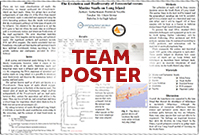
Team Info
- Program:
- Urban Barcode Research Project
- Year:
- 2024-25
- Research Topic:
- Biodiversity & trade
- Taxonomic Group Studied:
- Animals: Vertebrate
Project:
From Fins to Genes: Exploring the Mitochondrial DNA of Captive Seahorses
- Students:
- Lily Huang, Saoirse Healy
- Institution:
- Brooklyn College of the City University of New York,
- Mentors:
- Tony Wilson
Abstract:
Increasing global urbanization poses significant risks to biodiversity through habitat degradation and overfishing that threaten species like the pot-bellied seahorse (Hippocampus abdominalis), native to New Zealand and south-eastern Australia. To address these challenges, our study investigates the genetic diversity of a captive-bred pot-bellied seahorse population produced by Seahorse Australia, an aquaculture facility that aims to reduce the harvest of animals from natural populations. Using mitochondrial DNA D-loop sequencing, our research aims to assess the genetic variation of 47 H. abdominalis individuals (24 males and 23 females) sourced from this captive population. Our genetic results provide insight into the maternal genetic lineage of this population, guiding future breeding strategies to maintain genetic health and reduce the risk of inbreeding. Our research provides important insights that may help the management of threatened seahorse populations and improve seahorse aqu

